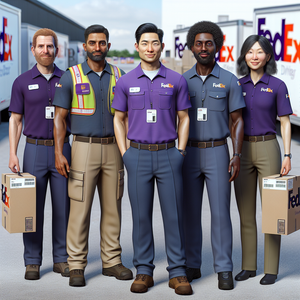The Tech Revolution: How FedEx is Shaping Careers in Logistics

FedEx has long been recognized for its innovative approach to logistics, but recent technological advancements have propelled its operations to new heights. The company has made substantial investments in technology to streamline processes, enhance efficiency, and improve customer service. A prime example of this is the implementation of AI-driven analytics for route optimization and delivery time reduction. For instance, FedEx utilizes sophisticated AI algorithms to predict package delivery times. By analyzing historical data and real-time traffic conditions, these algorithms provide accurate estimates that help allocate resources effectively. This not only enhances operational efficiency but also improves customer satisfaction by setting realistic delivery expectations. Consequently, there is an increasing demand for skilled employees who can manage and interpret these AI systems, creating a new career trajectory within the logistics sector.
Emergence of New Roles and Skills
As FedEx embraces advanced technologies, a host of non-traditional roles are emerging that require unique skill sets. Positions related to data science, machine learning, and automation engineering are becoming critical to the company's success. These roles not only support the technological infrastructure but also play a vital role in strategic decision-making. Moreover, FedEx actively seeks candidates who possess a blend of technical skills and soft skills. While proficiency in data analytics and familiarity with AI tools are essential, collaboration and effective communication across diverse teams are equally important. This holistic approach to recruitment reflects an understanding that the future of work in logistics will rely not solely on technical capabilities but also on interpersonal skills.
Training and Development Initiatives
To ensure its workforce is equipped with the necessary skills for this technology-driven future, FedEx has implemented comprehensive training and development initiatives. The company offers various programs focusing on upskilling employees in data analysis, software development, and machine learning. These initiatives aim to prepare existing employees for new roles while attracting new talent eager to work in a progressive environment. For example, FedEx's partnerships with educational institutions to create specialized training programs illustrate its commitment to workforce development. These collaborations provide employees with hands-on learning experiences and access to the latest industry knowledge and technologies, thereby enhancing their capabilities and career prospects.
The Impact on Company Culture
As FedEx integrates technology into its operations, it is simultaneously fostering a culture of innovation and adaptability. This cultural shift is crucial for attracting talent that is not only skilled but also aligned with the company's vision of leveraging technology to enhance logistics operations. Employees are encouraged to share ideas and contribute to the technological advancements being made, creating an environment where innovation can flourish. The culture of inclusivity and collaboration is particularly attractive to younger generations entering the workforce. The opportunity to work in a tech-centric environment where they can engage in meaningful projects is a significant draw for potential employees. By prioritizing a culture that values technology and innovation, FedEx is positioning itself as an employer of choice in the logistics sector.
The technological revolution at FedEx transcends the mere adoption of new tools; it signifies a fundamental shift in how logistics careers are structured and what skills are vital for success. As the company continues to innovate, it is also redefining its workforce to meet the demands of the future. By investing in employee development, embracing non-traditional roles, and cultivating a culture of innovation, FedEx is not just shaping careers in logistics; it is setting a benchmark for the industry. Looking ahead, it is evident that the intersection of technology and logistics will offer exciting opportunities for those who are ready to adapt and thrive in this dynamic environment.
Data Scientist in Logistics
FedEx, UPS, Amazon
Core Responsibilities
Develop predictive models using machine learning to improve delivery time accuracy and route optimization.
Analyze large datasets to identify trends and insights that enhance operational efficiency.
Collaborate with cross-functional teams to implement data-driven strategies.
Required Skills
Proficiency in programming languages such as Python or R and experience with data visualization tools (e.g., Tableau).
Strong statistical analysis skills and experience with machine learning algorithms.
Familiarity with logistics operations and supply chain management.
Automation Engineer
FedEx, DHL, Siemens
Core Responsibilities
Design and implement automated systems for sorting and tracking packages.
Troubleshoot and maintain automated equipment to ensure operational efficiency.
Work closely with software developers to integrate automated systems with existing platforms.
Required Skills
Expertise in programming languages such as C++ or Java, and experience with automation tools (e.g., PLC programming).
Knowledge of robotics and control systems relevant to logistics operations.
Strong problem-solving skills and attention to detail.
AI Product Manager
FedEx, Google, IBM
Core Responsibilities
Oversee the development and deployment of AI solutions within logistics operations.
Gather and prioritize product requirements based on stakeholder feedback and market research.
Collaborate with engineering teams to ensure AI products meet business needs and customer expectations.
Required Skills
Experience in product management with a focus on AI or software products.
Strong understanding of machine learning principles and their application in logistics.
Excellent communication and organizational skills.
Supply Chain Data Analyst
FedEx, Walmart, Target
Core Responsibilities
Analyze supply chain performance metrics to identify areas for improvement.
Create reports and dashboards to communicate insights to management and stakeholders.
Work with logistics teams to optimize inventory levels and reduce costs.
Required Skills
Proficiency in data analysis tools such as SQL, Excel, and statistical software.
Understanding of supply chain dynamics and logistics operations.
Strong analytical and critical thinking skills.
Machine Learning Engineer
FedEx, Tesla, Uber
Core Responsibilities
Develop and implement machine learning models to enhance logistics operations, including demand forecasting and route planning.
Test and validate models to ensure accuracy and reliability in real-world applications.
Collaborate with data scientists and software engineers to integrate models into applications used by the company.
Required Skills
Strong programming skills in Python or Java, with experience in machine learning libraries (e.g., TensorFlow, PyTorch).
Knowledge of data preprocessing techniques and experience in model evaluation.
Familiarity with cloud computing platforms (e.g., AWS, Azure) is a plus.


